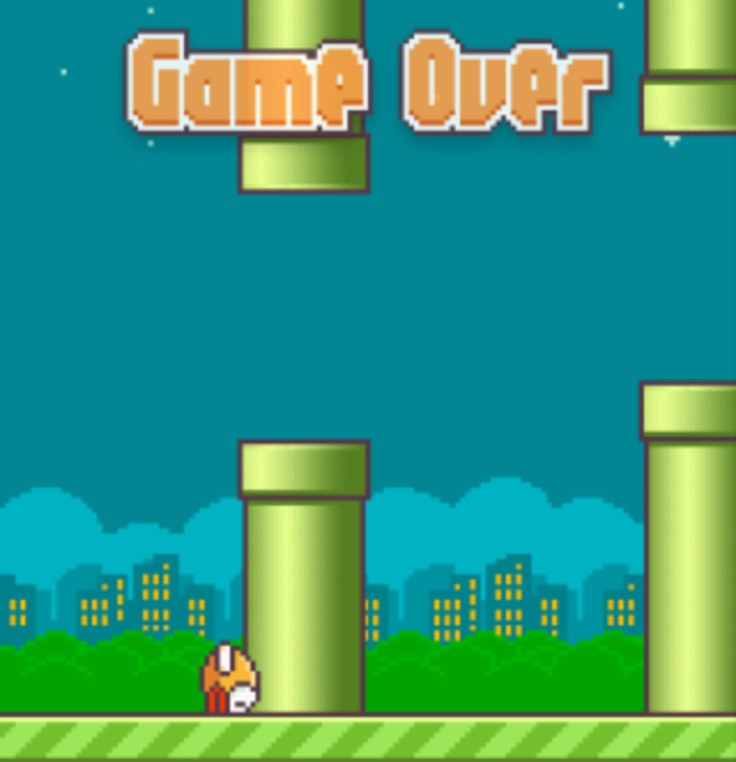'Flappy Bird' No Longer Available For Android And iPhone: Why Apple And Google Are Banning Clone Apps
Apple and Google are cracking down on "Flappy Bird" knockoffs.

It was bound to happen. Apple and Google are cutting the cord on “Flappy Bird” clones. Both companies are taking action against eager developers hoping to make a quick buck from the post-frenzy of “Flappy Bird.”
Developer Ken Carpenter of Mind Juice Media created a game called “Flappy Dragon.” After submission, his game was rejected in Apple’s app store. Carpenter said the multibillion-dollar company claimed they found his “app name attempts to leverage a popular app” and denied it entry. “There are already Flappy Bee, Flappy Plane, Flappy Super Hero, Flappy Flyer and even Flappy Bird Flyer (and many more),” Carpenter tweeted on Feb. 14.” But Flappy Dragon? Noooo…you've taken it too far sir!”
The Verge reported an Apple spokesperson claimed the company isn’t only rejecting games with the word “flappy” in the title, but games that are attempting to trick purchasers into thinking it is a replacement for the original “Flappy Bird.” When Carpenter’s “Flappy Dragon” was rejected, Apple told him "do not use irrelevant, misleading, or excessive keywords in apps descriptions, titles, or metadata." Makes sense. It would be unfair for app developers to cash in on millions of forlorn gamers missing the original "Flappy Bird."
"I had included a sentence about ‘Flappy Dragon’ being the best flappy game now that Flappy Bird was dead," Carpenter told The Verge on Feb. 16. He attempted to submit “Flappy Dragon” a second time and was turned down again. He then changed the name to “Derpy Dragon,” which is currently available. "It makes no sense to me," he added.
“Flappy Bird” was published by Vietnam-based Gears Studio last May. At one point, the title was currently being downloaded 2 million to 3 million times per day and pulling in $50,000 in ad revenue daily in Google Play and Apple iOS stores. "Flappy Bird" received an iPhone update in May 2013 and an iOS6 update in September of last year. It topped the free category of downloadable games in the American and Chinese iTunes App Store at the end of January 2014.
As the game grew in popularity, criticism of “Flappy Bird” began to gain traction. Though Nguyen admitted he was a fan of early Nintendo games, many players and bloggers suggested he was more than a fan, as “Flappy Bird” was similar in many ways to 1985’s “Super Mario Bros.” Kotaku even called the mobile game “plagiarism” and “ripped art.” Another blogger questioned whether the massive success of “Flappy Bird" was due to the use of bots, or fake accounts run by computers to falsely create downloads or reviews. "Looking at some of the top apps in the store by Nguyen, I hate to say it, but it looks really similar to bot activity," Carter Thomas, of online marketing company Bluecloud Solutions, said in a recent blog post. "Of course, I can’t prove this, and there are strong cases for lots of different potential growth strategies, but I do want to bring this up to engage a discussion and get industry leaders to weigh in with some analysis so that we can find out how this happened."
On Feb. 9, Nguyen removed the game, claiming it was due to the amount of criticism and negative press it was receiving. “I am sorry, 'Flappy Bird' users, 22 hours from now, I will take 'Flappy Bird' down. I cannot take this anymore,” Nguyen tweeted on Saturday. He also denied that he was asked to remove the app by Nintendo, a speculation made by many gaming sites. “It is not anything related to legal issues. I just cannot keep it anymore,” he posted on Feb. 8.
In the wake of "Flappy Bird's" demise, it isn't surprising that app developers are hoping to generate revenue from the original title's massive success. But is it ethical for Apple and Google to crack down on game clones? Leave a comment or Tweet me!
© Copyright IBTimes 2024. All rights reserved.












